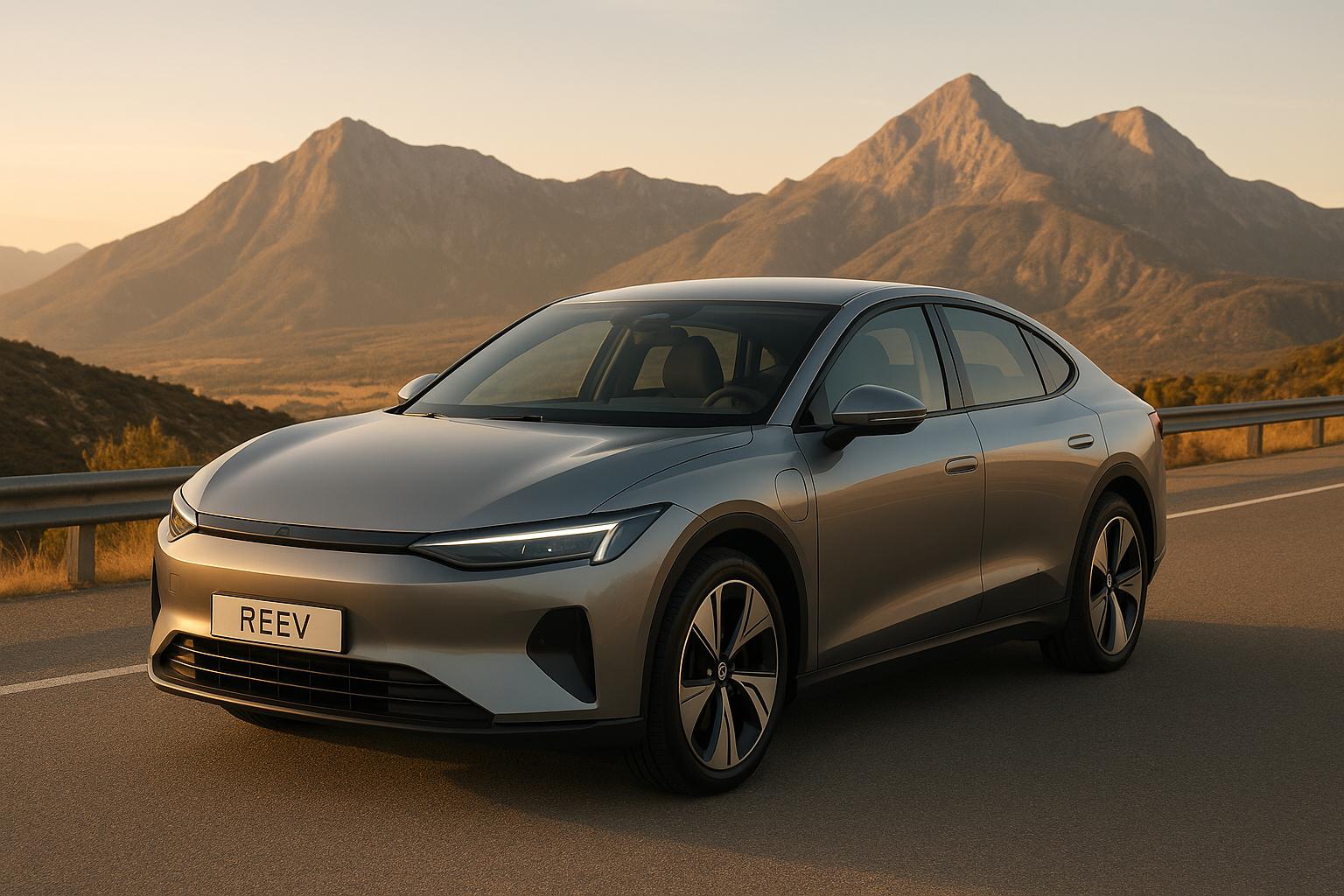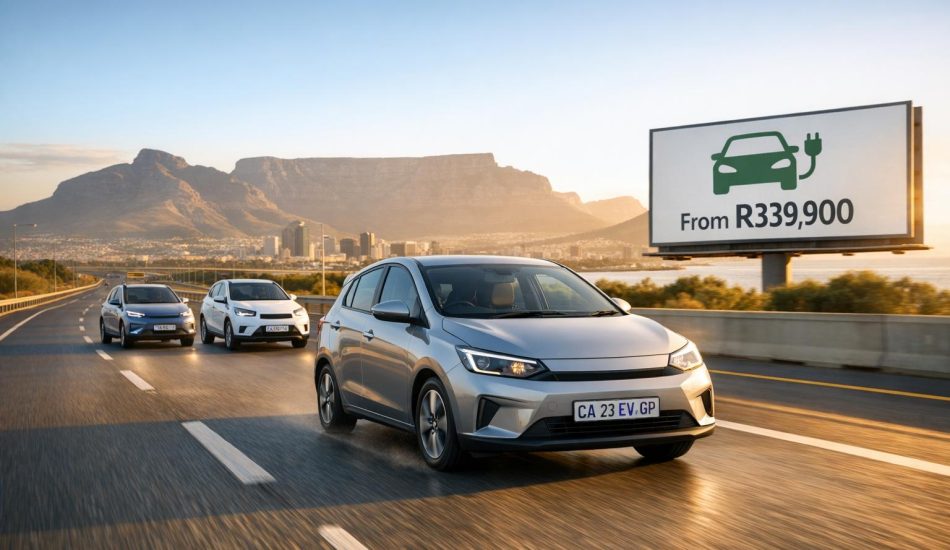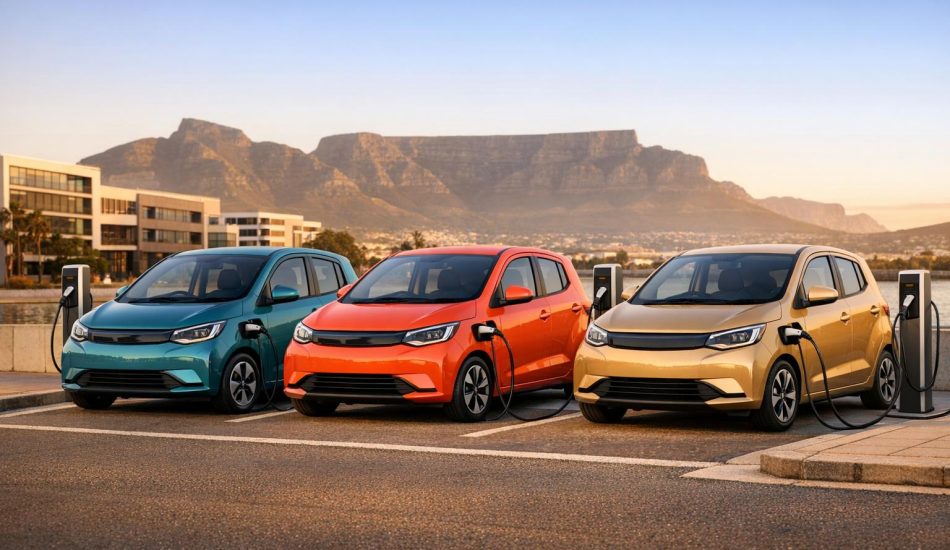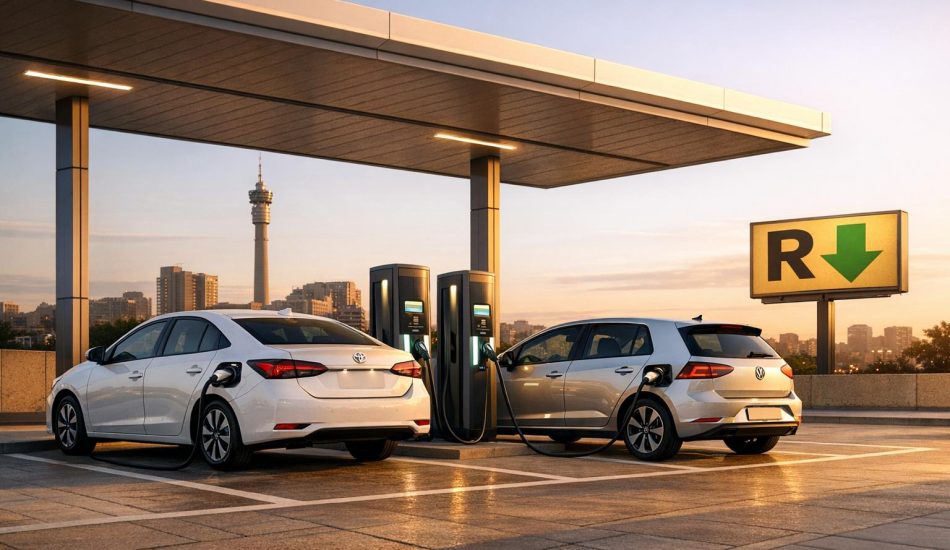
Range-Extended Electric Vehicles (REEVs) are a smart middle ground between fully electric cars and hybrids. They offer electric driving for daily use with a gasoline-powered generator as a backup for longer trips. Unlike hybrids, the engine in REEVs doesn’t drive the wheels – it only recharges the battery when needed.
Key Takeaways:
- Electric-first driving: REEVs rely on an electric motor for propulsion, ensuring a quiet and smooth experience.
- Backup generator: A small gasoline engine kicks in only when the battery is low, extending the total range.
- Flexible refueling: Charge at home or public stations for daily trips; refuel with gas for extended travel.
- Great for areas with limited chargers: Especially useful in regions with underdeveloped charging networks.
In 2025, REEVs are gaining attention as a practical solution for drivers who want the benefits of electric vehicles without the worry of running out of power. They’re particularly helpful in markets like Africa, where charging infrastructure is still growing. Platforms like EV24.africa are making these vehicles more accessible by simplifying the buying process and offering financing options.
If you’re looking for a car that combines electric efficiency with long-range reliability, REEVs might be the perfect fit.
How Does An Extended Range Electric Vehicle Work?
How REEV Technology Works
REEVs (Range-Extended Electric Vehicles) combine smart design and practical functionality to offer both efficiency and convenience. Their operation is built around a system that merges electric and gasoline technologies to create a seamless driving experience.
REEV Powertrain and Components
The core of a REEV lies in its dual-power system, which pairs an electric motor with a compact range extender. The electric motor is the main driver, directly powering the wheels for smooth and quiet acceleration.
The battery pack is carefully sized to provide enough electric-only range for typical daily driving, all while keeping weight and costs in check. Like other electric vehicles, this battery is recharged by plugging into a power source.
When the battery’s charge runs low, the range extender – a small internal combustion engine – kicks in. This engine generates electricity, either recharging the battery or powering the motor directly. Sophisticated controls ensure the range extender activates only when necessary, balancing efficiency and minimizing emissions.
The transition between pure electric driving and generator support is so seamless that most drivers won’t even notice when the range extender starts working. This setup ensures a quiet, electric-first ride with the added reassurance of a backup system for longer distances.
Range Capabilities and Refueling Options
REEVs are designed with flexibility in mind, making them perfect for both short commutes and longer trips. The electric-only range is ideal for daily driving, while the range extender significantly increases the total distance you can travel. This eliminates the anxiety often associated with limited charging infrastructure.
Charging options are versatile: you can plug in at home using standard outlets, use faster home or public charging stations, or even opt for quick-charging solutions when time is tight.
For longer journeys, the onboard gasoline engine adds a layer of convenience. Refueling with gas is as simple as stopping at any gas station, giving you the freedom to travel far without worrying about finding a charging station. This dual-system approach means you can enjoy the benefits of electric driving for everyday use while still having a reliable backup for extended trips.
Top REEV Models for 2025
The year 2025 is shaping up to be a pivotal moment for Range-Extended Electric Vehicles (REEVs). These vehicles combine the benefits of electric driving with the added security of backup power, making them ideal for both short daily commutes and longer road trips. By addressing "range anxiety", they promise a reliable driving experience across various scenarios.
2025 REEV Models Overview
Automakers are gearing up to release REEVs across a diverse range of categories, from rugged work trucks to luxurious SUVs. These vehicles feature large battery packs paired with built-in generators, extending the driving range significantly. Some manufacturers are even exploring cutting-edge fuel cell technology, which could allow for quicker refueling times. Early reports suggest that these upcoming models will cater to both urban drivers and those needing long-distance capabilities. With these advancements, platforms like EV24.africa are poised to bring these innovations to a broader market.
REEV Models Available via EV24.africa

EV24.africa is opening new doors for African consumers to access REEV technology. Serving all 54 African countries, this platform simplifies the process of purchasing both new and pre-owned REEVs. From the initial purchase to local registration, EV24.africa handles every step, ensuring a seamless experience for buyers across the continent.
To make REEV ownership more accessible, EV24.africa offers financing options tailored to local economic realities, with flexible payment terms. Buyers also benefit from expert consultations to identify the best REEV for their needs. This support includes advice on practical factors like fuel and charging infrastructure availability, driving habits, and maintenance considerations. Additionally, EV24.africa assists with setting up home charging systems and locating nearby public charging networks, ensuring a smooth transition to electric mobility.
Through partnerships with trusted shipping and logistics providers, as well as service networks skilled in maintaining both electric and traditional vehicle components, EV24.africa guarantees that vehicles arrive in excellent condition. Buyers can also rely on comprehensive after-sales support, ensuring long-term satisfaction with their REEV purchase.
REEVs vs Traditional EVs and Hybrids
REEVs (Range-Extended Electric Vehicles) offer a clever mix of electric efficiency and the practicality of a backup generator, catering to a variety of driving needs. They combine the strengths of electric performance with the convenience of a gasoline-powered generator.
Comparing REEVs, BEVs, and Hybrids
Today’s automotive market offers several electrified options, each with a unique way of blending electric motors and traditional powertrains:
- Battery Electric Vehicles (BEVs) run entirely on battery power, with no reliance on gasoline.
- Plug-in Hybrid Electric Vehicles (PHEVs) pair electric motors with gasoline engines, giving drivers the flexibility to use either power source.
- Traditional hybrids use a gasoline engine alongside a small electric motor, enabling limited electric-only driving.
REEVs stand apart by using a generator-only engine. While their electric-only range is shorter than that of BEVs, they compensate with an extended total range thanks to the onboard gasoline generator. In terms of cost, REEVs often land between BEVs and hybrids, appealing to drivers who want the efficiency of electric driving but also appreciate the convenience of quick refueling.
This design directly addresses one of the biggest concerns for EV drivers: range anxiety.
How REEVs Solve Range Anxiety
Range anxiety – the fear of running out of battery power with no charging station in sight – remains a major hurdle for many potential EV buyers. REEVs tackle this issue by seamlessly switching to generator power when the battery gets low, ensuring uninterrupted driving without the need for long charging breaks.
This ability to quickly transition from battery to generator power makes REEVs ideal for longer trips, especially in areas where charging infrastructure is still catching up. Drivers can rely on gasoline, readily available at any gas station, to keep their journey going without worry.
sbb-itb-99e19e3
REEVs and Africa’s Electric Vehicle Transition
Africa’s shift toward electric mobility comes with its own set of hurdles. Traditional battery-only electric vehicles (EVs) often fall short in addressing the continent’s unique challenges, such as long distances and limited charging infrastructure. This is where REEVs (Range-Extended Electric Vehicles) step in, offering a practical solution by blending electric efficiency with a gasoline backup.
Why REEVs Make Sense for Africa
Africa’s vast landscapes and sparse charging networks make REEVs a natural fit. Unlike fully electric vehicles that depend entirely on charging stations, REEVs provide a much-needed safety net for regions with unreliable grids and limited charging points. This flexibility is crucial in areas where pure EVs struggle to gain traction.
Take Nigeria, for example. The country’s abundant natural gas reserves open the door to innovative solutions like compressed natural gas (CNG)-powered range extenders. By utilizing CNG, REEVs in Nigeria can significantly cut operating costs while addressing the issue of "range anxiety" – the fear of running out of power far from a charging station.
"For SAGLEV’s Nigerian/African market, EREVs could be highly strategic: A CNG-based range extender could leverage Nigeria’s abundant gas resources, keeping costs low. It solves range anxiety where charging infrastructure is still limited. It could be a good transitional technology while full EV infrastructure scales." – Brifers, September 2025
Modern REEVs are also impressively fuel-efficient, consuming just 2.8 liters per 100 km (about 84 miles per gallon). This not only keeps fuel costs manageable but also ensures that drivers can rely on widely available gasoline when charging isn’t an option. For Africa, REEVs represent a practical stepping stone toward broader electric mobility, even as charging infrastructure gradually improves.
EV24.africa: Driving REEV Adoption
Recognizing the potential of REEVs in Africa, EV24.africa has positioned itself as a key player in making these vehicles more accessible. As the continent’s central digital hub for electric vehicles, EV24.africa simplifies the process of finding, buying, and importing REEVs, removing the complexities of international purchases.
The platform offers a range of services that make REEV ownership easier. Buyers gain access to flexible financing options, reliable delivery across all 54 African countries, and comprehensive after-sales support, including maintenance networks and bulk purchasing solutions. Detailed vehicle specs, transparent pricing, and customer reviews further help first-time EV buyers make confident decisions. By addressing logistical and financial barriers, EV24.africa is paving the way for a smoother transition to electric mobility across the continent.
REEV Buying Guide for African Consumers
Purchasing a REEV (Range-Extended Electric Vehicle) in Africa requires careful planning to manage its dual electric and gasoline systems effectively. Here’s a breakdown of what you need to know for a seamless ownership experience.
Key Factors to Consider
Service Center Availability
Check if the manufacturer has a reliable service network in your country. REEVs need skilled technicians for maintenance. Urban hubs like Lagos, Nairobi, and Cape Town often have better support, while rural areas might have limited access to specialized services.
Charging Infrastructure Planning
Although the range extender acts as a backup, having a solid charging plan is crucial. Identify charging stations along your usual routes and, if possible, set up a home charging station to ensure convenience.
Fuel Quality and Availability
Make sure the local fuel quality meets the engine’s requirements. Opt for models with durable fuel management systems to handle variations in fuel standards.
Total Cost of Ownership
Factor in the overall costs, including the purchase price, electricity, gasoline, maintenance, and any additional fees, based on your driving patterns.
Import and Registration Requirements
Understand your country’s import rules, registration processes, and tax incentives to plan your budget accurately.
Once you’ve considered these aspects, you can take steps to make the most of your REEV ownership.
Maximizing REEV Ownership Value
Choose Models with Reliable Local Support
Pick REEV models backed by established local service networks to ensure easy access to maintenance and repairs.
Optimize Your Charging Strategy
Installing a home charging system can reduce dependence on public stations and help manage energy costs. Charging during off-peak hours can add convenience and save money.
Maintain Both Systems Regularly
Follow the manufacturer’s maintenance schedule for both the electric and gasoline systems. Regular servicing, including checks for the range extender, ensures your REEV stays efficient and dependable.
Monitor Your Usage Patterns
Track your daily driving and charging habits. Use electric mode for shorter trips to save on fuel, and rely on the range extender for longer journeys.
Plan for Battery Replacement
Understand your battery’s warranty terms and prepare for potential replacement or leasing costs when the time comes.
Explore Bulk Purchase Options
If you’re a business owner or fleet operator, consider EV24.africa’s dealer programs. These programs may offer discounts, extended warranties, and other benefits, making bulk purchases more cost-effective and straightforward.
Conclusion
Range-Extended Electric Vehicles (REEVs) serve as a practical bridge between traditional gasoline-powered cars and fully electric vehicles. By combining the efficiency of electric driving with a gasoline generator for backup, they address range anxiety – especially in areas where charging infrastructure is still developing – and cater to a variety of driving needs.
This hybrid approach allows drivers to enjoy the perks of electric mobility for daily commutes while having the reassurance of a gasoline-powered generator for longer trips. It’s a solution that encourages the shift to electric vehicles without having to wait for widespread charging networks to catch up. By easing concerns about range and infrastructure, REEVs pave the way for more people to embrace electric transportation.
As charging networks expand, REEVs are well-positioned to evolve into predominantly electric vehicles, making them a smart choice for those looking to invest in the future of sustainable transport.
To support this transition, EV24.africa is making electric mobility more accessible across the continent. With a strong dealer network, flexible financing options, and delivery to all 54 countries in Africa, they’re helping consumers take the first step toward an electric future.
With REEVs, you can confidently start your electric journey today, even as infrastructure continues to evolve.
FAQs
What makes Range-Extended Electric Vehicles (REEVs) different from hybrids and fully electric cars in terms of driving and range?
REEVs deliver an experience that closely mirrors driving a fully electric vehicle – offering quiet operation and immediate torque – while tackling the issue of range limitations. Unlike traditional hybrids, which rely on both gasoline and electric power to drive the wheels, REEVs use a small internal combustion engine purely as a generator. This engine kicks in to recharge the battery when it gets low, enabling these vehicles to cover impressive distances, often ranging between 400 and 800 miles, without frequent stops to recharge.
In contrast, hybrids typically offer much shorter electric-only ranges, usually between 20 and 50 miles, and don’t provide the same seamless all-electric driving experience. Fully electric vehicles, while completely emission-free, can leave some drivers worrying about range due to their dependence on charging infrastructure. REEVs strike a practical balance, combining the efficiency of electric driving with the extended range that alleviates charging concerns.
What should buyers in areas with limited charging stations, like Africa, consider when choosing a Range-Extended Electric Vehicle (REEV)?
When choosing a REEV in areas where charging stations are scarce, it’s wise to prioritize models with a longer electric range. These vehicles can travel farther on a single charge, minimizing the need for frequent recharging. It’s also worth considering whether you have access to charging at home or work, as this can significantly cut down your dependence on public chargers.
Another factor to think about is the development of local charging infrastructure. Future improvements could make charging more accessible, so staying informed about regional plans can be helpful. Pay close attention to the vehicle’s battery capacity and fuel efficiency to ensure it aligns with your daily travel needs. Range-extender technology is a practical feature, offering extra reassurance by reducing the chances of being stranded in areas with limited charging options.
How does the gasoline generator in a REEV affect its environmental impact compared to fully electric vehicles?
Range-Extended Electric Vehicles (REEVs) combine the benefits of electric driving with the convenience of a backup gasoline generator. This setup allows them to travel longer distances without being entirely dependent on charging stations. While REEVs produce fewer emissions compared to traditional gas-powered vehicles, their internal combustion engines still emit some greenhouse gases. In contrast, fully electric vehicles (EVs) have zero tailpipe emissions, making them a cleaner choice overall.
REEVs offer a practical solution to ease range anxiety while reducing emissions compared to conventional cars. However, they don’t entirely eliminate environmental impacts since gasoline is still required for extended trips. For those aiming to shrink their carbon footprint, REEVs represent a meaningful step forward, particularly in regions where charging infrastructure is still growing.




